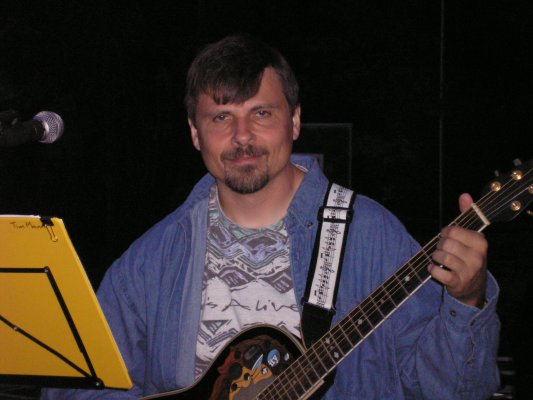

|
Here's a chance to hear me singing and playing my guitar. I'm not Johnny B. Goode, but I do lead singalongs on a regular basis for some church groups I'm involved in. I also like to do secular music when I get a chance. I write songs occasionally, but so far the only original song of mine on this page is Fireproof.
Pictured (and on all the recordings so far) is my old Ovation Celebrity Deluxe CC257. For Christmas 2009, I bought myself a new Taylor GS5, a fantastic guitar that I can't really do justice to... but it does make me sound better!
Some of the tracks on this page are compressed in Ogg Vorbis format. Your media player may already accept this format, but if you find it doesn't, you can get a player that does from the Vorbis web site. Free players are available for Linux, Windows, and other operating systems.
I've put together a simple digital home recording setup using an M-Audio Delta 1010LT 8in/8out sound card in my home Linux box, using Ardour as the multitracking software. I'll be adding some of the results here as they come out.
Elastic Sky is the "house band" at VMware, where I work. It's an informal group of musicians who get together occasionally to play for company events. It's been exciting to get to play and sing with them, since everyone else in the band is really good. Most of the other members have been in other bands that perform in public regularly. You can find a few photos I took of some of the band members in 2006 in my photo gallery.
In 2009 we got the chance to play as the opening act at the VMworld party. VMworld is an annual virtualization conference sponsored by VMware with thousands of attendees. There is a big party the evening of the last day, and this year's featured attraction was Foreigner. So we get to say that we opened for Foreigner! We've uploaded videos of our set to YouTube:
I recorded the tracks below in 1996, mostly for the kindergarten teacher at my church to use in singalongs with her class. All but the last are songs I'd been doing as songleader at Tree of Life Lutheran Bible Camp. Fair warning: You probably don't want to listen to these unless you're a friend of mine or a former camper at Tree of Life. They are, uh, kind of uneven. The last is a piece I had just learned in one of Carol McComb's guitar classes. It's probably the most listenable of the lot. Thanks go to my friend Sarah Pundt Halfen for backup vocals on some of the tracks.
In the past I did a tiny bit of work on the ALSA sound drivers that is now included in the official sources (starting with 0.9.0beta5). I added support to card-serial.c for the Midiator Systems MS-124W and MS-124T serial port MIDI adaptors. I'm no longer involved in this project, however, and have given away my Midiator adaptor.
Background: A serial port MIDI adaptor is useful if you need to control external MIDI devices from a computer that has a serial port but does not come with a MIDI port on its sound card. Such an adaptor converts from the RS-232 signal levels and data rates that a standard PC serial port can produce to the MIDI standard of 5 mA current loop at 31.25 kb/s. Because of the difference in data rates, the adaptor typically must do some extra handshaking to prevent the PC from sending data to the serial port faster than it can be relayed to the MIDI port. In some cases there is also extra handshaking to select among multiple MIDI ports (as with the MS-124W). This extra handshaking tends to work differently for each serial port MIDI adaptor on the market, and is usually undocumented. My addition to the ALSA driver implements the necessary handshaking for MS-124W and MS-124T, which fortunately are publicly documented.
There is also partial documentation for the Midiator MS-101 and MS-124 available, but I didn't work on ALSA support for them since I had no unit to test with. Note that the MS-124, MS-124W, and MS-124T are not the same; each needs its own driver support.
I've also heard from another programmer (Matt Larson) who is working on Portman PC/S support; this is another similar gadget from the Midiman company. I didn't follow up to see whether Matt finished and submitted that code.
Generally, laptops tend not to have serial ports anymore, so gadgets like these are a dying breed. USB MIDI adaptors are more practical these days.